Most world-class athletes will be supervised by a security team and the closest you could hope to get to them is a rushed autograph at best. Fortunately for us, gravel riding is a different world. Earlier in the year, Olly was fortunate enough to be invited to go and join a group of passionate gravel riders as they participated in the inaugural Trans-Nepal gravel event. The head guide on the trip was Usha Khanal, who as a former Nepali cross-country and downhill national MTB champion, is as close to cycling royalty as you could hope to meet. Olly persuaded Usha to give up an hour of her precious free time during the trip so that we could find out a little more about what makes her tick.
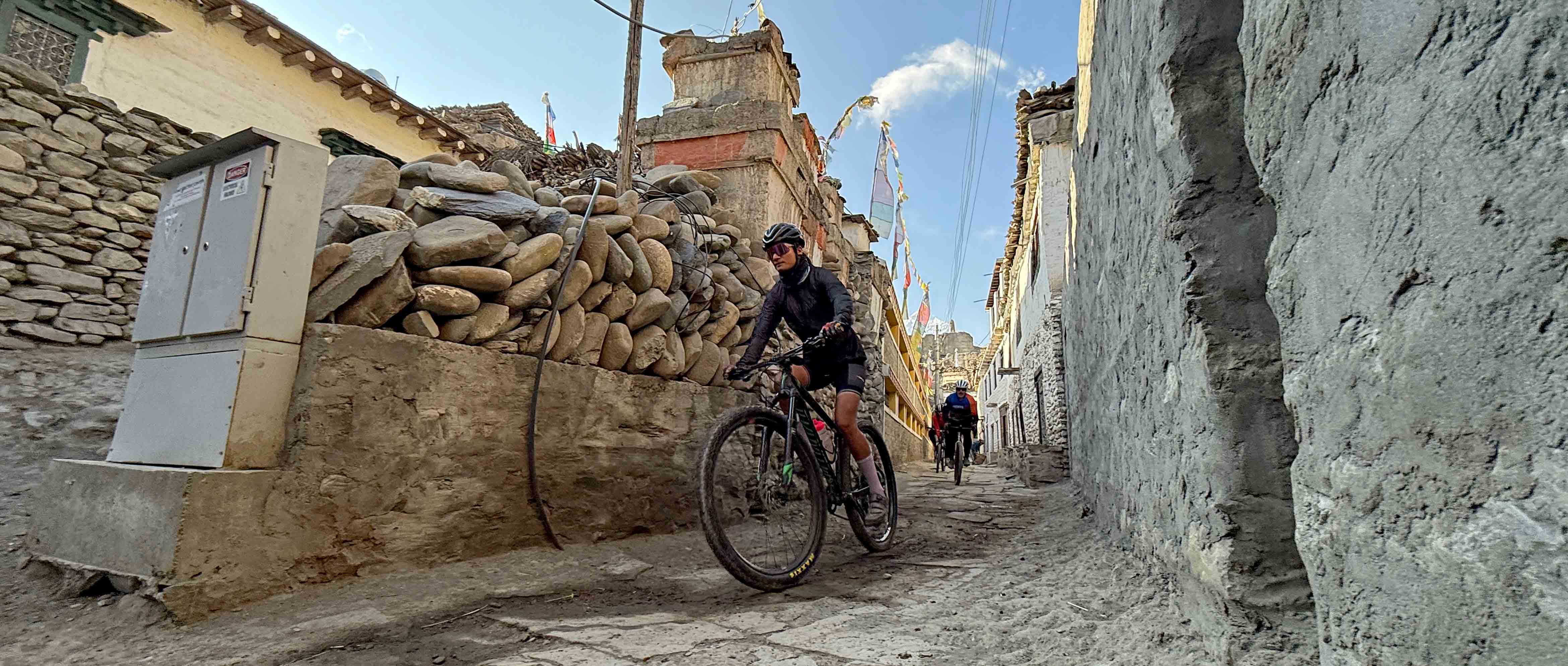
I was sitting across from Usha Khanal at an outside table in the lush gardens of the hotel that we’re staying at. One of the other participants on the trip spots us sitting together and shouted something about “I hope you pass the interview and get the job”, but I wasn't sure whether they were referring to Usha or to me! In a past life, I worked in the adventure travel industry and at one point I was responsible for more than 100 guides who ran holidays for the travel company that I worked for. Over the years, I’ve worked with many hundreds of guides from all over the world and can honestly say that Usha stands head and shoulders above everybody else (and that is against some impressive competition). This made interviewing her more of a challenge than I was expecting, as I was desperately trying to remain professional, while being completely in awe of her and the incredible job she had done during our Trans-Nepal trip.
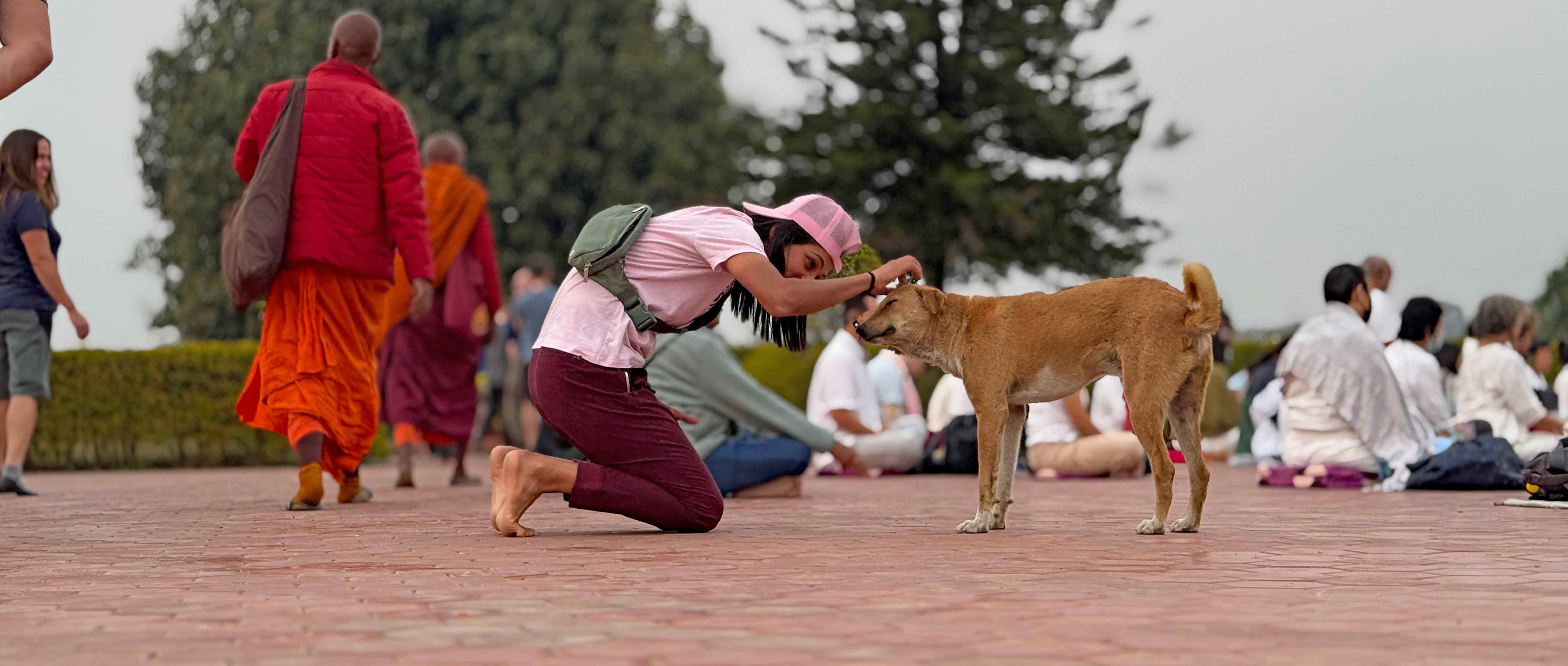
Working as a professional cycling guide is an extremely strange job. Taking something you love passionately and trying to make a career out of it is not easy and you very quickly discover that 99% of the role is not about riding your bike at all. During the course of a cycling trip the guides will do everything from literally guiding the route to overseeing logistics to managing incidents to being a translator & cultural expert to managing the other local staff who help run the trip. Every cycling guide around the world will do all of this (and more), but what was so incredible about Usha was her ability to do all of this while also managing to be the perfect ambassador for Nepali women.
Everywhere we went, it was apparent as soon as we walked in the door (generally tired, dishevelled and hungry) that local people thought the world of her. Usha would be greeted by the family who owned the different accommodation or the cafés that we stopped at as through she was their daughter returning from a long journey and she would instantly manage to both fit in and also to take over. Good guides have this innate ability to make everything work seamlessly, but without being bossy or overly demanding and Usha managed this perfectly. On our first night in the mountains we stayed in an amazing teahouse called YakDonalds. Despite the incredibly warm welcome that we received from our hosts when we arrived, it was obvious that they were understaffed, so even though she must have been just as tired as the rest of us, Usha instantly became part of the family and did everything from taking food orders, to producing bills to answering questions about the area from other guests staying at the lodge.
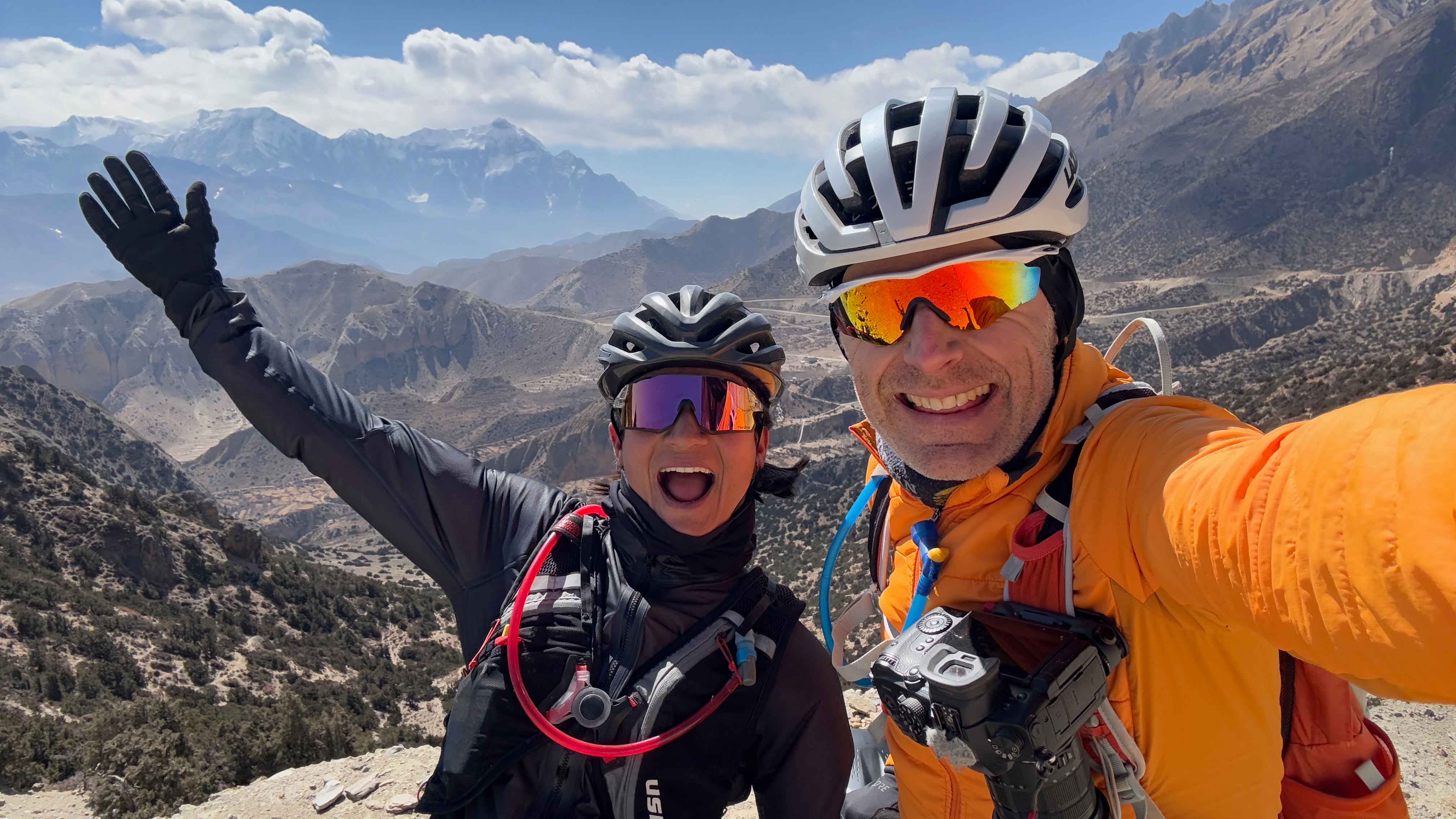
Despite having left the travel industry a decade ago, I couldn’t avoid subconsciously watching what Usha was doing and assessing how she was managing both the group and the trip as a whole. She balanced perfectly the need to be in charge with her unofficial role of motivating, inspiring and looking out for both the customers and the staff that were helping her run the trip. In short, she was a superstar. What made it even more incredible though was that she mixed her guiding duties with competing as an elite-level cyclist - a really difficult juggling act to try and balance.
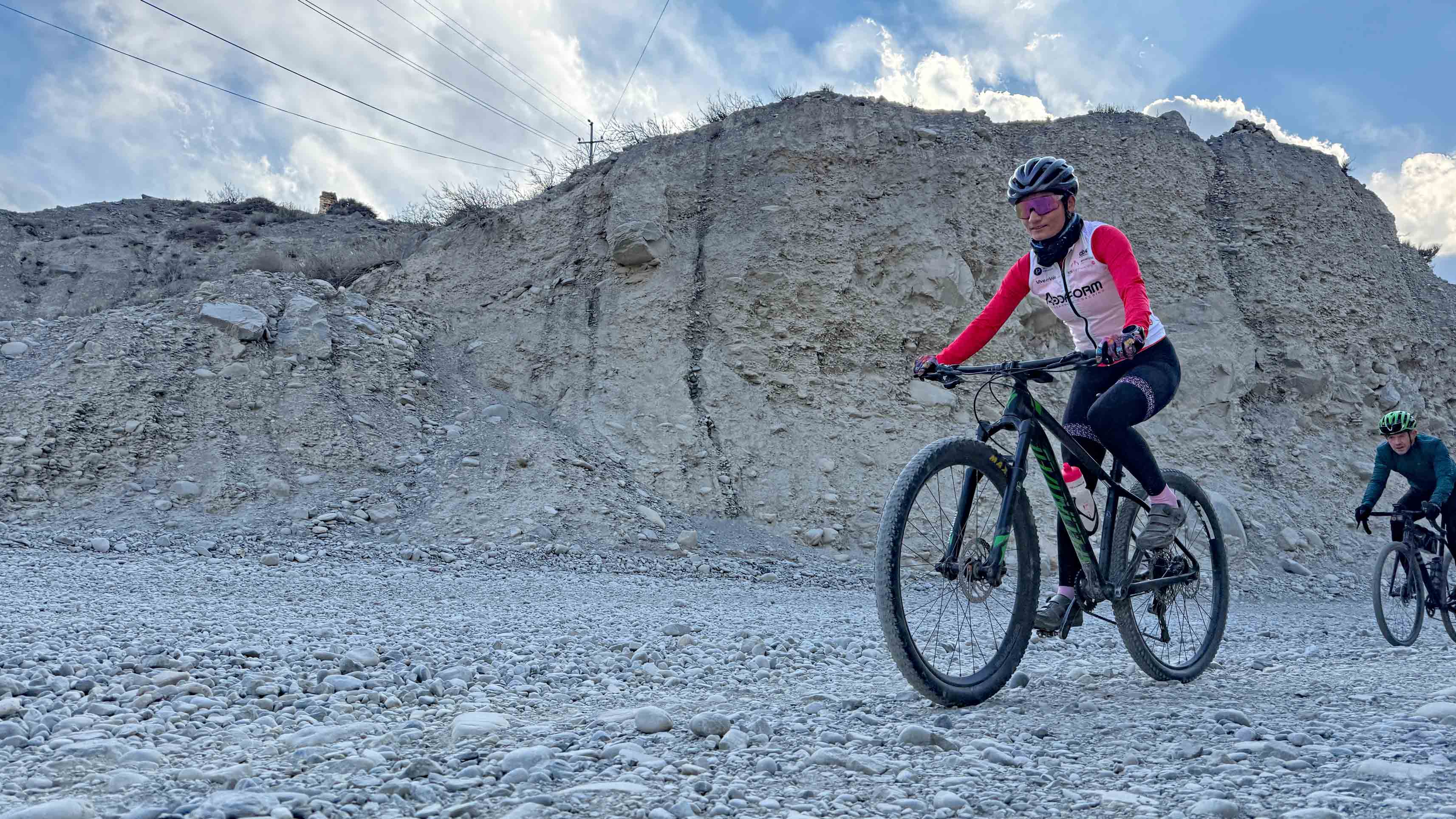
I started our conversation by asking Usha about her introduction to the world of bikes and cycling. “I was still in school when I first rode a Hero bicycle. The frames only came in one size and they’re really big. I hurt myself quite badly in a crash when I was twelve or thirteen and at that point I said that I wasn’t going to ride a bicycle again. I didn’t think about riding a bike in a professional way until I was 22, which was the first time I saw people racing bikes. Until then, I didn’t really know that there was something called mountain biking. There was one girl at the race that I went to watch who was absolutely flying – she came downhill so fast and I was really shocked. After the race, I started being friends with some of the mountain bikers and that was how I got into cycling.”
“Somebody once asked me what would count as an adventure for me and at the time, I said that just getting out of the house and going somewhere on my bike was a big adventure”
Next, I asked Usha how unusual she was being a female cyclist “It depends on the part of Nepal that you’re from” she replied “If you’re in the Terai, the flat land part of Nepal, you will see most women riding bikes as part of their daily lives – to go school, to go to work or to go to the market. Because it’s so flat, it’s not hard, so most people use bikes. But if you talk about Kathmandu, it’s pretty hilly, there’s lots of traffic and it’s so crowded, so it’s quite challenging to start cycling there. There isn’t so much space where you can learn to ride a bike. When I started cycling in Kathmandu, my family were concerned about me. In Nepal, a boy can be ugly, but women need to be beautiful in order to get married. Many people think that if the girl is not beautiful, the guy will not like her and she will never get married. So my parents were concerned that if I fell off my bike or if something happened and I broke something or became permanently disabled, who was going to marry me? They did it out of love, but they were not happy about the idea of me cycling. Somebody once asked me what would count as an adventure for me and at the time, I said that just getting out of the house and going somewhere on my bike was a big adventure. For men, it’s not the same. They can say they’re going cycling with their friends and their parents would not have any more questions for them. But when a woman sets out from her house, she has to answer so many questions. I wouldn’t say that it’s very unsafe here, but if I’m going somewhere remote on my bike, I have to think about what would happen if I came across a group of men and I was alone. “
I asked Usha next if there was a community of women cyclists in Nepal and for a moment she looked crestfallen. “At one point the number of female riders was going up a lot, but just at the minute, the numbers are going down again. As an athlete, because I race mainly in XC MTB, the numbers for both men and women are going down. It’s a really expensive sport and we don’t have much support. Riders with more money are riding in Enduro only – they don’t want to suffer in cross country events. Enduro and downhill is growing in popularity in Nepal, but the opposite is happening in cross country. Previously there might have been fields of 50-60 riders in the men’s categories, whereas now you might get only ten and there’s barely six in the women’s field. In comparison, you will get a hundred or more riders at a downhill or enduro event.”
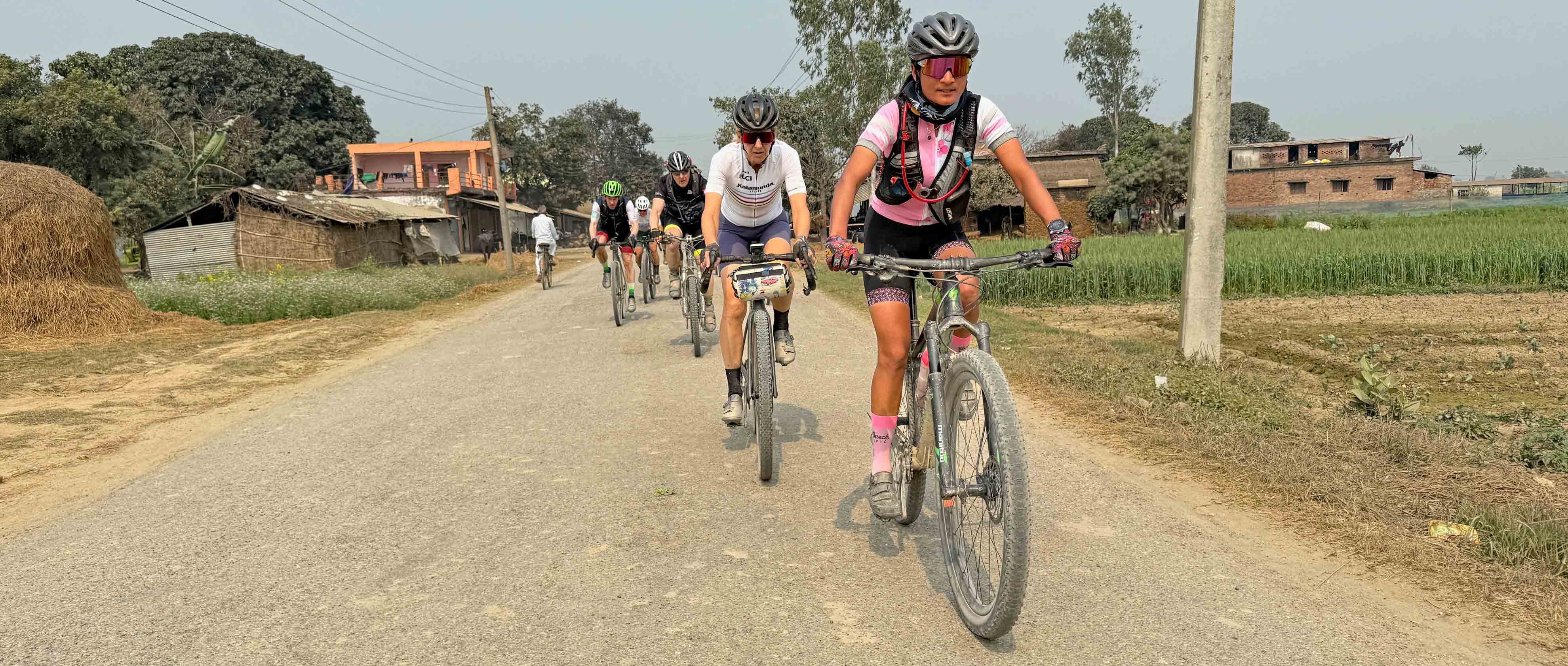
We chatted next about her career as a guide and I asked her how she first got into it? “In 2015 it was the first time I rode a mountain bike. At the time I was doing a teaching job and there was a large earthquake in Nepal. I had received some funding from the Nepali Provident Fund just before and as I was just getting into cycling, I took my funding and bought a bike, which cost 55,00 Nepali Rs (roughly £300/€350), but I didn’t dare to tell my parents. I hid the bike at a friend’s house for a week as I was scared to show them at home. But eventually I found the courage and took the bike home. My parent’s initial reaction was that I should have used the money to buy a motor scooter as that would have helped me get to work, but then in the aftermath of the earthquake there was a lockdown at the Nepali/Indian border and nothing was coming into Nepal, including fuel. There was a huge drop in the number of vehicles on the street, so suddenly cycling became very nice! With no access to fuel, my parents could suddenly see the benefits of cycling. I would cycle to fetch whatever we needed. So I ended up buying the bike with perfect timing.”
“At the end of 2016 I left my job. At the start of 2017 we received news that an American company wanted to make a documentary about Nepali women mountain bikers. At the time I was really just a beginner, but the film company contacted ten or twelve women riders and told us about their plans for the film and said that they would be happy to feature us in the movie. Only three of us replied saying that we would like to be involved. After the movie aired, a bike shop in Kathmandu approached me and asked if I would be interested in working for them as a guide. As I had already left my teaching job I was looking for opportunities so I joined their bike shop and worked for them for 1.5 years. That’s really where my journey started – first being featured in the movie, then getting a job with the shop as a mountain bike guide. For the first year I was an assistant guide, then from 2018 I started guiding trips on my own.“
At this point, Usha wanted to do more riding and get into racing, which led to some quite big changes in her life. “I was working long hours in the shop, sometimes 12-13 hours a day and I realised that I wouldn’t be able to improve my level of riding if I was always just working in the shop, so at the end of 2018 season I quit my job there. In 2019 I started training much more on my bike. In December 2019 the South Asian Games were held in Nepal and I was really strong at the time, even beating the former Nepali women’s champion during some of our training rides. But in November I crashed and had a scaphoid fracture in my hand and tore some ligaments. This was just a month before the games and I was very down, but I decided to race anyway and I managed to win a silver medal. After the games I had to have an operation to repair my scaphoid and three surgeries to repair my damaged knee [which Usha damaged in a crash earlier in 2019]. I had four operations at the same time, which took more than six hours! I wasn’t able to ride my bike again until August or September in 2020. During that time I put on nearly 10 kg in weight and none of my clothes would fit. I spent the last part of 2020 trying to get back into shape.”
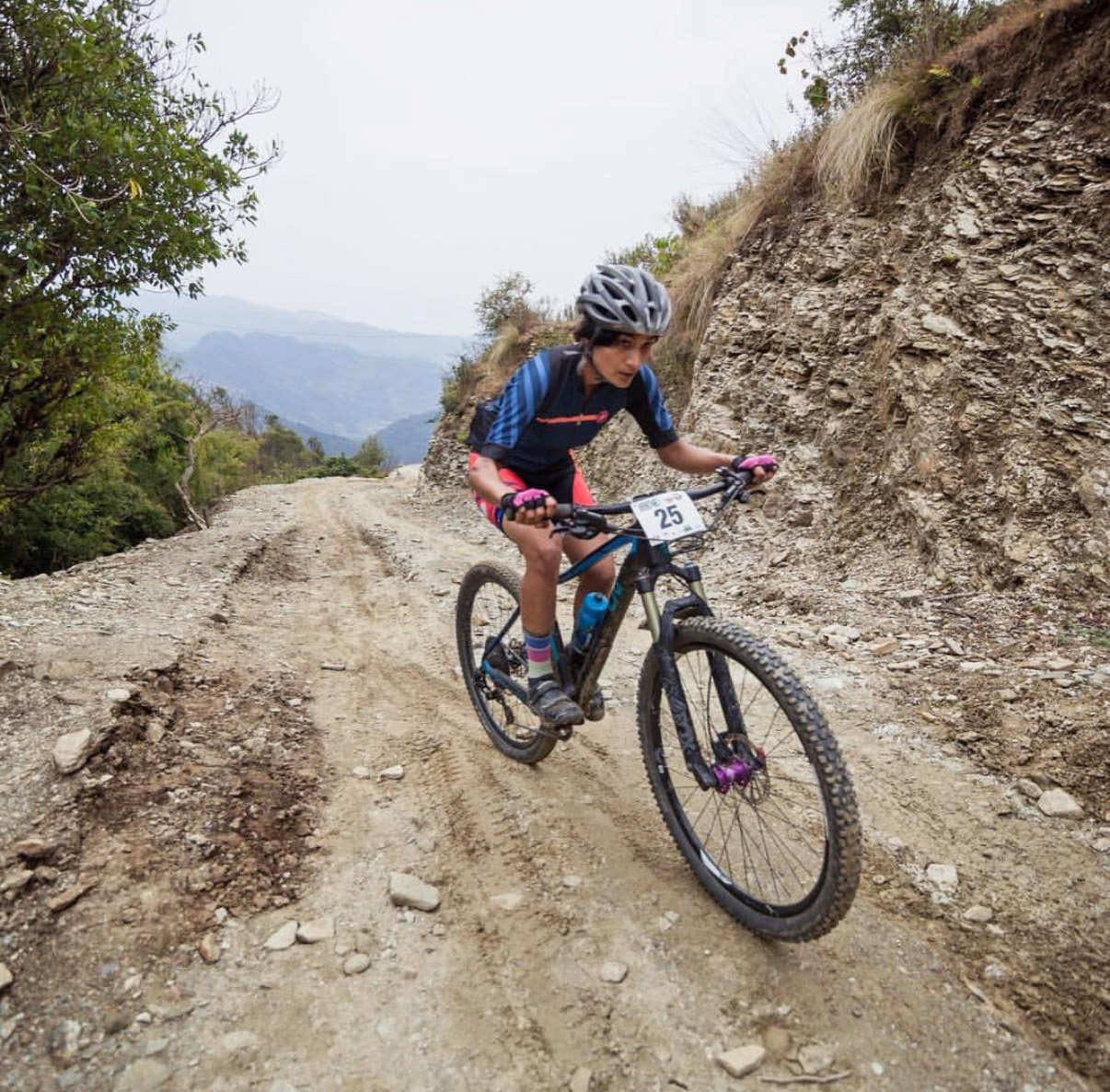
Image courtesy of Usha Khanal
“In 2021 I joined the Nepali army and I trained and raced with them. They have a very regimented training system, with two sessions a day which you have to do. I decided that training with them was the best way to get back into shape. I trained with them for the whole year. I had an indoor trainer too and I used it to help get back into shape. By the start of 2022 I was back in really good shape again, but in May my mum was diagnosed with Stage 4 breast cancer. At this point my life turned upside down again. I’m the only daughter in the family. My Mum had to go through surgery and there was no-one to look after her. Before the diagnosis my parents ran a café in a government office and that was the main source of income for the whole family. It was unknown who was going to run the shop, who was going to look after my mum, so what I did was to completely leave biking. From this point onwards I started to look after my mum and to run the shop. I was busy from 6 a.m. until 10 p.m. making sure my mum ate properly and took her medicines, as well as managing the shop. That went on for six months and during this time I shut myself off from the world. I felt really bad and so I shut down my social media. I even shut down my phone as I didn’t want anyone to call me. I just looked after my mum and looked after my family. “
“At this point I had no plan to come back to cycling. I literally didn’t touch my bike for seven months.”
“After six or seven months, after she was done with the chemotherapy and the radiation treatment, my mum started to get better, but at this point I had no plan to come back to cycling. I literally didn’t touch my bike for seven months. During this time I went down to 48 kg because of the mental and physical stress. At one point Ajay and one of my other friends came to find me. They didn’t know exactly where I lived, but they managed to find me. They said that they hadn’t heard anything from me so they came looking. They scolded me and said that I should have told them what was going on.
At one point, the major from the Nepali army called me. I went to see him and I told him that although I loved riding my bike, I had to look after my family and I didn’t think I would be able to ride again. I told him that my family was more important than myself and my hobbies or my career. He made me realise though that my family was not just my responsibility and that my brothers needed to help too. For a couple of hours he talked with me and made me realise that the world didn’t stop just because my mum got cancer. Afterwards it took me a week to make a decision, but eventually I decided that I wanted to go training again.”
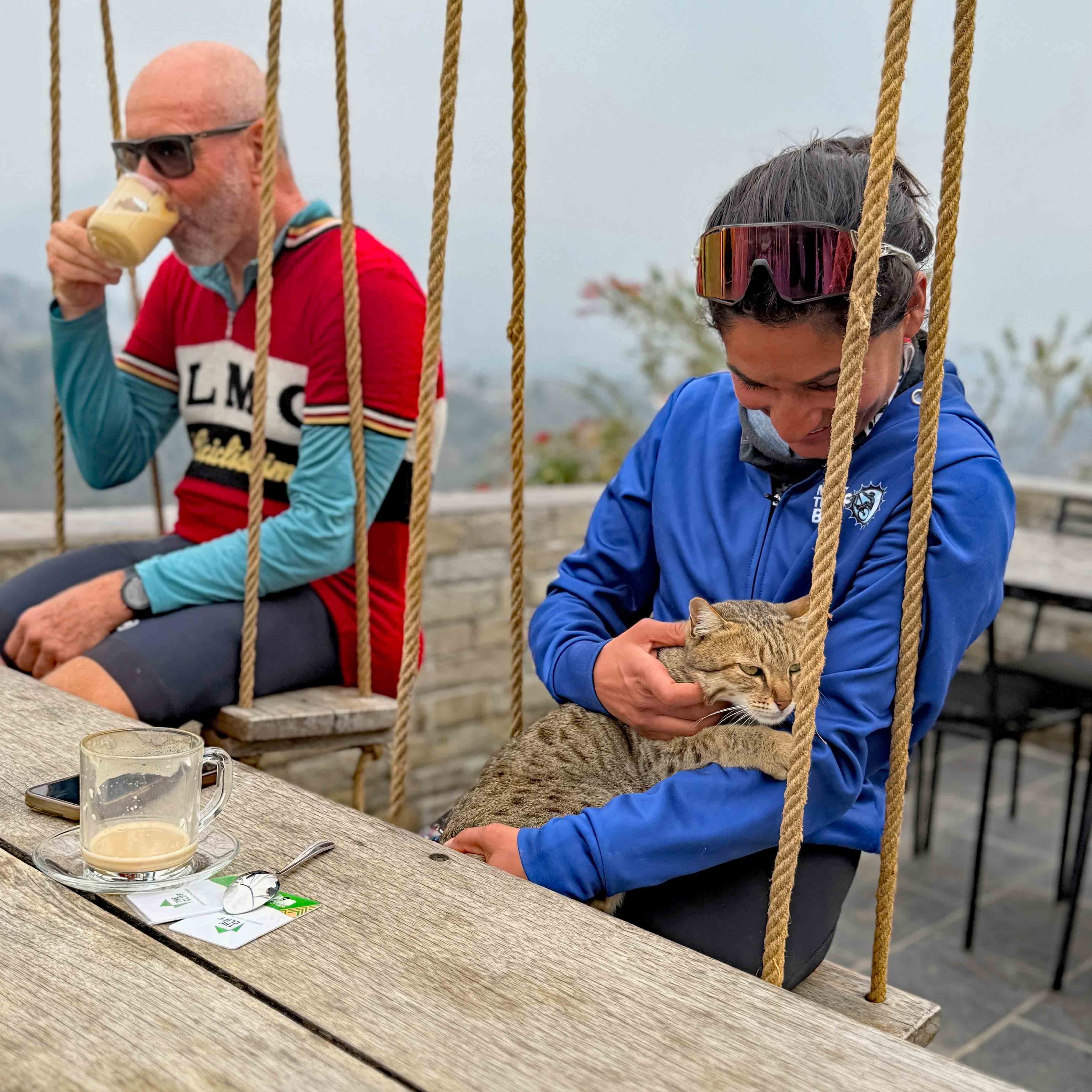
“During the time that I had been looking after my mum, I hadn’t been keeping up with my physio or doing exercises to help rehabilitate my knee. I realised that I wanted to go and train again so I talked with my brothers and told them that they needed to help. My mum was really supportive and she said that I needed to go and train again. I started going training in the morning, coming home for some food and then working in the shop. It was really tiring as I wanted to rest, but I could not. I managed to juggle everything and when I competed again, I won. After a year of this, my mum became ill again and was in and out of hospital. Sometimes she needed to be oxygen even.
At this point in 2022 I was doing a bit of guiding again. During the Autumn of 2022 I had back-to-back guiding work lined up, but my mum became very ill and was admitted to hospital. There was a big shortage of guides in Nepal and I had to leave my mum and go to work. I couldn’t find anyone to take my place on the trip, but I can still clearly remember that during this trip, I messed up so many things. I was mentally not ready. Straight after the trips was the national games and I was supposed to win gold medals, which was why the Nepali army hired me. My mum had been in hospital for more than a month and I hadn’t been able to train properly. In the end, I got two gold medals and two silver, which was really disappointing for me. I was mentally exhausted and hadn’t trained enough.”
“In September 2023, I was awarded a place at the UCI World MTB Championships in Scotland. “
“At this time I was still juggling working in the shop, looking after my mum and guiding. In the selection games on the run-up to the worlds I won all of them, so I was selected, but during this period my mum’s health was deteriorating and we all knew that she was dying. I had my flight ticket booked and my visa was approved, but I didn’t know what to do. It would have been a once-in-a-lifetime opportunity, but I was just not ready. We were due to fly on the 5th September and on the 1st, my mum passed away. In Nepali culture, if either of your parents die, you can’t eat salt for eleven days (although this is reduced to five for daughters). On the fifth day after my mum passing away I flew out, but I knew that without training and without having had any salt that I was really weak.
In the event itself I did nearly two laps, but then I was pulled from the race [competitors whose lap times are below a certain percentage of the leading rider’s times are removed from the race]. A month later I was supposed to race in the Asian games in China, but I could not compete properly and I quit part-way through the race, after vomiting at the side of the course. I was just not prepared, either physically or mentally.
Since then I’ve started racing again and now I mix up racing with guiding.”
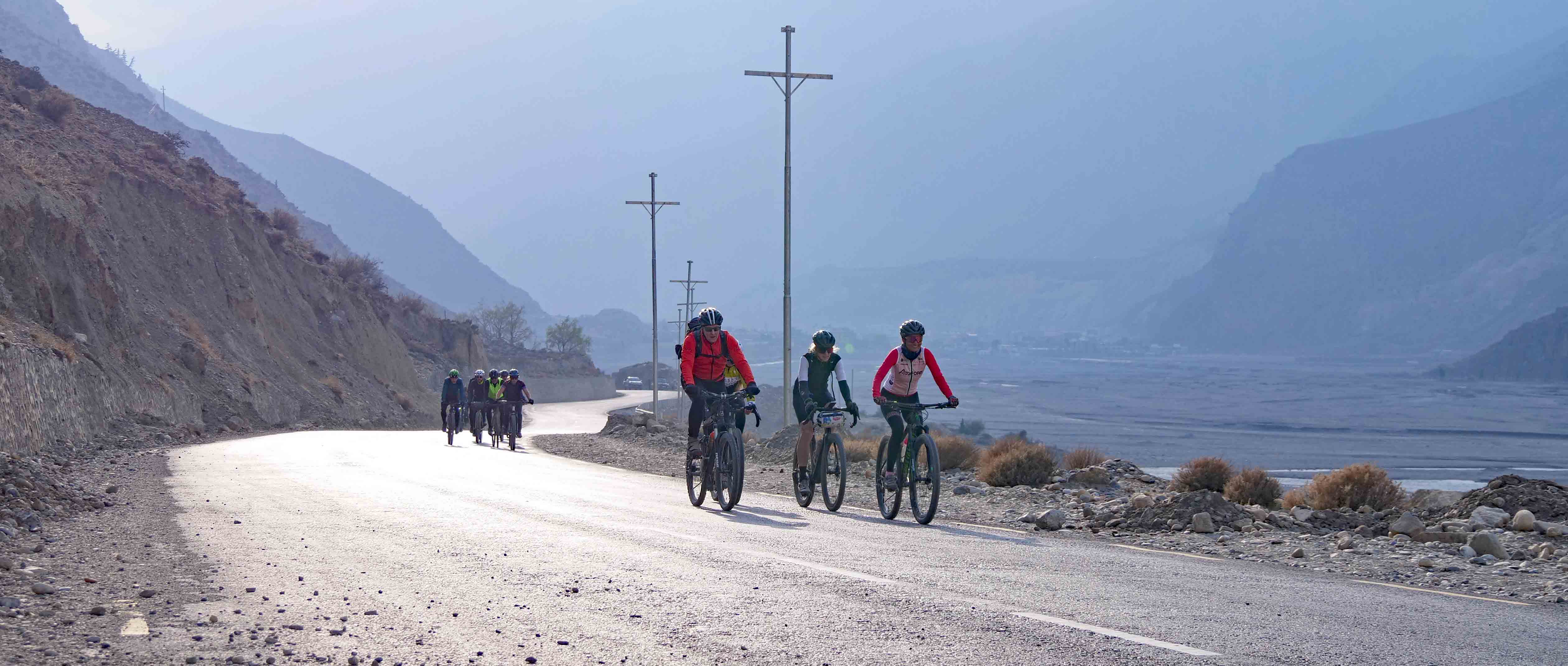
We continued our conversation and I asked Usha what the process was that she had go through to become a cycling guide?“You first have to have a Nepali trekking guide’s licence. First you apply to the government and assuming you pass the initial interview with them, then you take five weeks of classes and then you’re examined at the end. In 2017 after the movie, the bike shop hired an MTB coach from the UK who certified me as a MBLA Level 2 guide. Now I specialise in mountain bike trips. Right now, if you want to find a female Nepali guide who can guide trips in Upper Mustang, there is just me! There are a really limited number of female guides in general and particularly female MTB guides.”
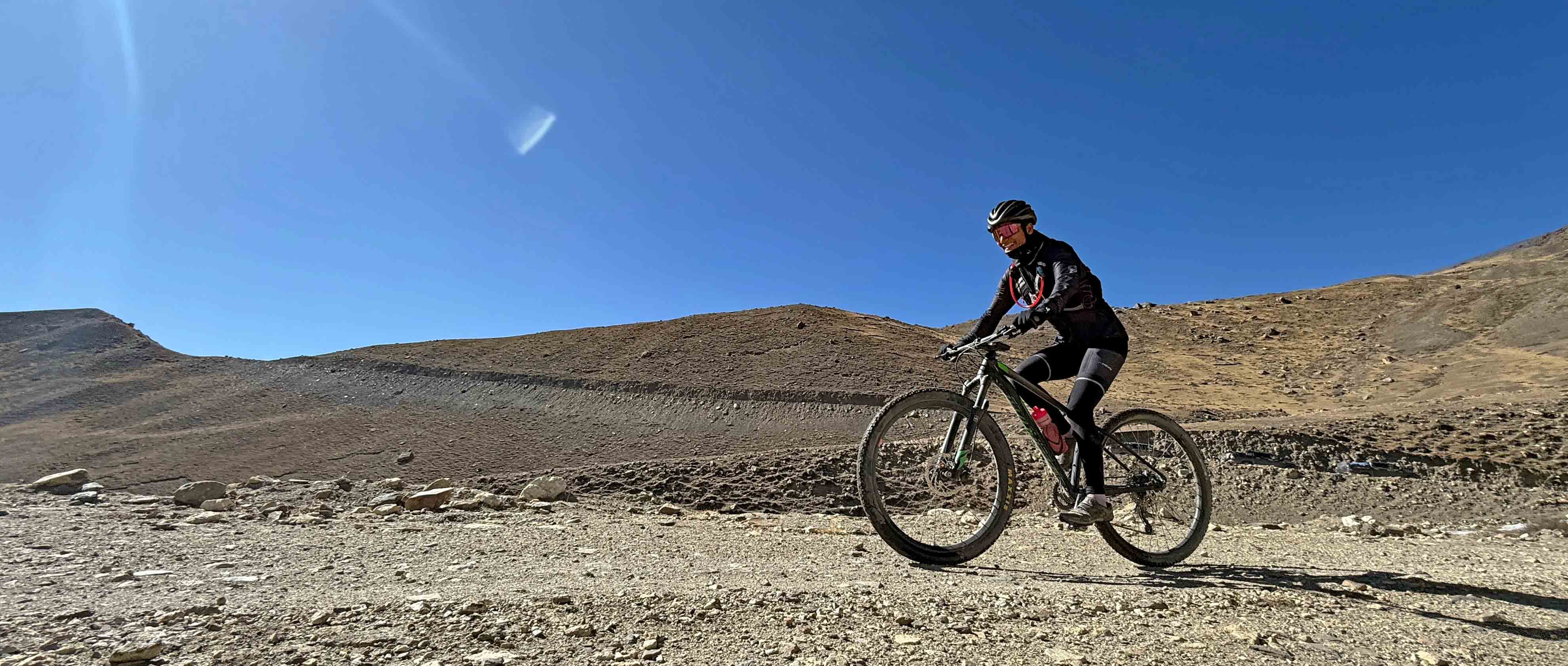
Usha guides on occasions for a non-profit organisation called World Ride. They run guided MTB trips in different parts of the world, which are designed to help empower local women. They hire female guides and use the profit from the trips to provide equipment, to run training courses and to create career opportunities for women in the different countries that they operate in. World Ride was set-up after one of the founders was involved in the 2017 Moksha film. World Ride accept bookings from both women and men, but all the MTB guides are women. This is remarkably uncommon in the adventure travel industry, so I asked Usha how she coped with the pressure and the expectations of being a female guide in a male-dominated environment?
“If I really want to do something then I will fight for it.”
“When I first started guiding in 2017 it was initially quite an awkward situation as the male guides weren’t used to having a female guide with them. Initially the male guides made comments which demotivated us and they were a little dismissive. One of the other new female guides didn’t deal with this well and she left. If I really want to do something then I will fight for it, so I trained harder and I just went for it. I wanted to prove the male guides wrong. I knew what my limits were, but I tried my best to do as well as possible. Over the years I have managed to change some attitudes. Female MTB guides are still very rare here and when local people see me they sometimes comment, but I say that it is just as hard for the men as it is for me, particularly when you’re working at altitude. The attitude is changing though and often local people make comments now about how strong I am. Even the attitude of the tea house owners has changed and now they’re really happy to see female guides.”
I asked Usha whether the attitude of the male guides had changed, whether they respected her more now and her answer was surprising. “The male guides always respected me. I consider myself very lucky to be in this industry. I basically always just ride with the boys, because there are so few women. The men respect me as a fellow athlete. They know how hard the job is and how difficult it is to be in this expensive sport. The industry itself has treated female guides really well and they respect me a lot.”
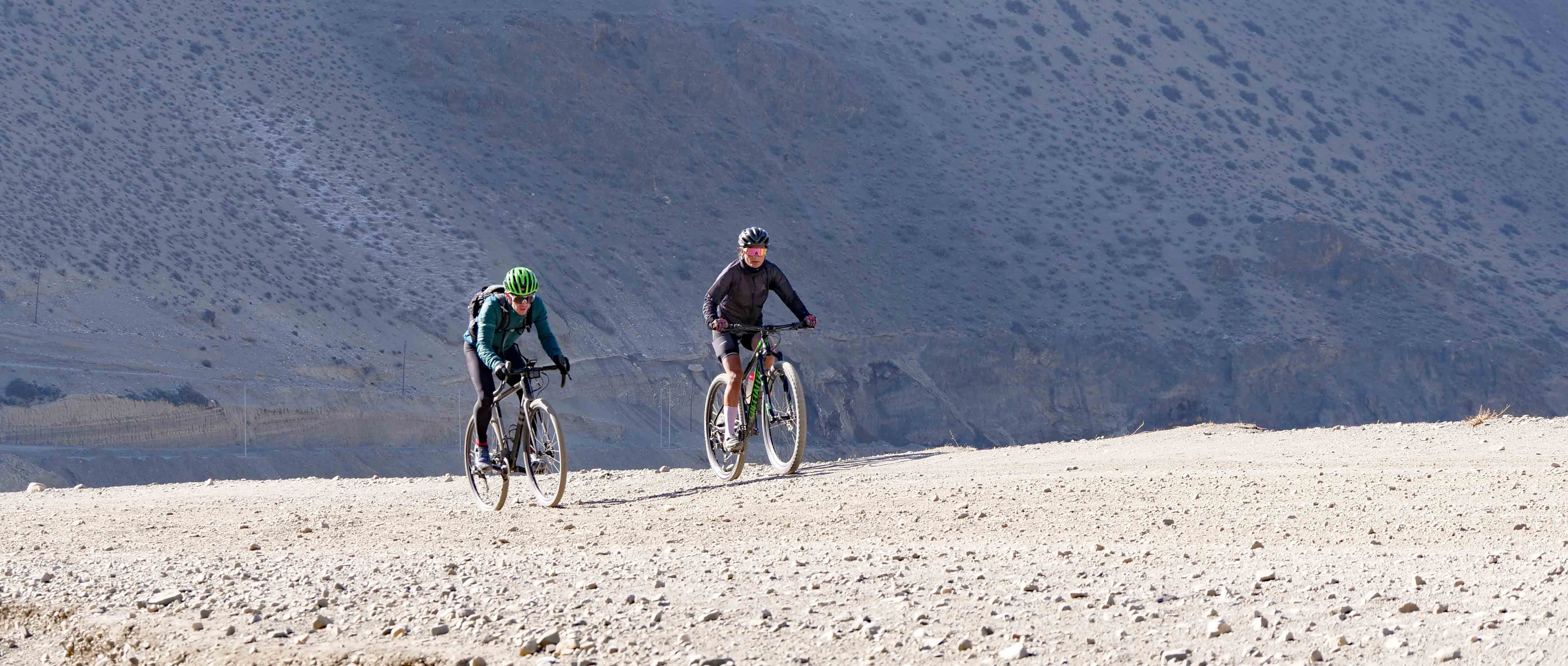
We chatted briefly about how hard Usha worked and all the extra tasks that she took on at the teahouses. “In the off-season particularly the guides have to do a bit of extra work in the tea houses. What happens when you’re guiding a trip is that you try and look after your clients by yourself. You don’t want to mess up anything, which means it’s better to do the jobs yourself and make sure that everything is perfect. For me, it’s my work, but for the customers it could be a once-in-a-lifetime trip, so I always try my best to make the trip memorable for the rest of their lives. I don’t want the customers to remember me, but I do want them to remember how amazing the trip was and how smoothly it went.”
“Every time I’m out on my bike, I don’t see anyone following me. I don’t see Nepali women doing what I do.”
Finally we chatted about the future. Had Usha considered what her life would be like once she finished guiding? “Every time I’m out on my bike, I don’t see anyone following me. I don’t see Nepali women doing what I do. Everything starts with money. Even if you have high passion, without money you can’t really do it. I’m incredibly fortunate that everything worked for me and the right doors opened up – from the movie to getting hired by the bike shop to getting my first carbon race bike. I started from the base and I have worked myself up. I didn’t ever give up, even when at one point I didn’t have a bike and I had to borrow someone else’s. From that point to now, where I can lend out one of my bikes to other female racers so that they can compete, I have come a long way.
"When I stop guiding, I want to be there for local women who have so much passion."
When I stop guiding, I want to be there for local women who have so much passion. They want to be here, but they don’t know how. I want to help support them financially, give them training. I have so many ideas, but I don’t have enough time at the minute. Once I finish guiding and competing, I will have the time and I will be able to focus more on giving something back. My future plan is to help get more women into biking.”
Usha, as you can probably tell, was a complete inspiration both to ride with and to spend time with. If anyone is able to help get more women involved in cycling in Nepal, she can, but she faces an uphill battle to overcome both the lack of funding and the wider societal issues.
If you would like to keep up to date with Usha’s story, then her Insta account is worth following, or even better try and book on one of the gravel trips that she will be leading in the future.